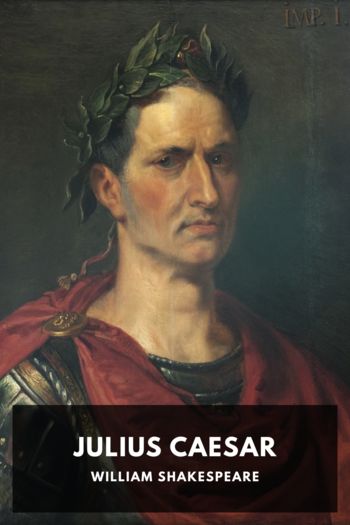Commentaries on the Gallic War by Julius Caesar (most popular ebook readers TXT) 📕

- Author: Julius Caesar
Book online «Commentaries on the Gallic War by Julius Caesar (most popular ebook readers TXT) 📕». Author Julius Caesar
When this scheme was disclosed to the Helvetii by informers, they, according to their custom, compelled Orgetorix to plead his cause in chains; it was the law that the penalty of being burned by fire should await him if condemned. On the day appointed for the pleading of his cause, Orgetorix drew together from all quarters to the court all his vassals to the number of ten thousand persons; and led together to the same place, and all his dependants and debtor-bondsmen, of whom he had a great number; by means of these he rescued himself from the necessity of pleading his cause. While the state, incensed at this act, was endeavouring to assert its right by arms, and the magistrates were mustering a large body of men from the country, Orgetorix died; and there is not wanting a suspicion, as the Helvetii think, of his having committed suicide.
After his death, the Helvetii nevertheless attempt to do that which they had resolved on, namely, to go forth from their territories. When they thought that they were at length prepared for this undertaking, they set fire to all their towns, in number about twelve—to their villages about four hundred—and to the private dwellings that remained; they burn up all the corn, except what they intend to carry with them; that after destroying the hope of a return home, they might be the more ready for undergoing all dangers. They order everyone to carry forth from home for himself provisions for three months, ready ground. They persuade the Rauraci, and the Tulingi, and the Latobrigi, their neighbours, to adopt the same plan, and after burning down their towns and villages, to set out with them: and they admit to their party and unite to themselves as confederates the Boii, who had dwelt on the other side of the Rhine, and had crossed over into the Norican territory, and assaulted Noreia.
There were in all two routes by which they could go forth from their country—one through the Sequani, narrow and difficult, between Mount Jura and the river Rhone (by which scarcely one wagon at a time could be led; there was, moreover, a very high mountain overhanging, so that a very few might easily intercept them); the other, through our Province, much easier and freer from obstacles, because the Rhone flows between the boundaries of the Helvetii and those of the Allobroges, who had lately been subdued, and is in some places crossed by a ford. The furthest town of the Allobroges, and the nearest to the territories of the Helvetii, is Geneva. From this town a bridge extends to the Helvetii. They thought that they should either persuade the Allobroges, because they did not seem as yet well-affected towards the Roman people, or compel them by force to allow them to pass through their territories. Having provided everything for the expedition, they appoint a day on which they should all meet on the bank of the Rhone. This day was the fifth before the kalends2 of April, in the consulship of Lucius Piso and Aulus Gabinius.3
When it was reported to Caesar that they were attempting to make their route through our Province, he hastens to set out from the city, and, by as great marches as he can, proceeds to Further Gaul, and arrives at Geneva. He orders the whole Province to furnish as great a number of soldiers as possible, as there was in all only one legion in Further Gaul: he orders the bridge at Geneva to be broken down. When the Helvetii are apprised of his arrival, they send to him, as ambassadors, the most illustrious men of their state (in which embassy Numeius and Verudoctius held the chief place), to say “that it was their intention to march through the Province without doing any harm, because they had no other route:4 that they requested they might be allowed to do so with his consent.” Caesar, inasmuch as he kept in remembrance that Lucius Cassius, the consul, had been slain, and his army routed and made to pass under the yoke by the Helvetii, did not think that their request ought to be granted; nor was he of opinion that men of hostile disposition, if an opportunity of marching through the Province were given them, would abstain from outrage and mischief. Yet, in order that a period might intervene, until the soldiers whom he had ordered [to be furnished] should assemble, he replied to the ambassadors, that he would take time to deliberate; if they wanted anything, they might return on the day before the ides of April.5
Meanwhile, with the legion which he had with him and the soldiers who had assembled from the Province, he carries along for nineteen miles6 a wall, to the height of sixteen feet, and a trench, from the lake of Geneva, which flows into the river Rhone, to Mount Jura, which separates the territories of the Sequani from those of the Helvetii. When that work was finished, he distributes garrisons, and closely fortifies redoubts, in order that he may the more easily intercept them, if they should attempt to cross over against his will. When the day which he had appointed with the ambassadors came, and they returned to him, he says that he cannot, consistently with the custom and precedent of the Roman people, grant anyone a passage through the Province; and he gives them to understand that, if they should attempt to use violence, he would oppose them. The Helvetii, disappointed in this hope, tried if they could force a passage (some by means of a bridge of boats and numerous rafts constructed for the purpose; others, by the fords of the Rhone, where the depth of the river was least, sometimes by day, but





Comments (0)